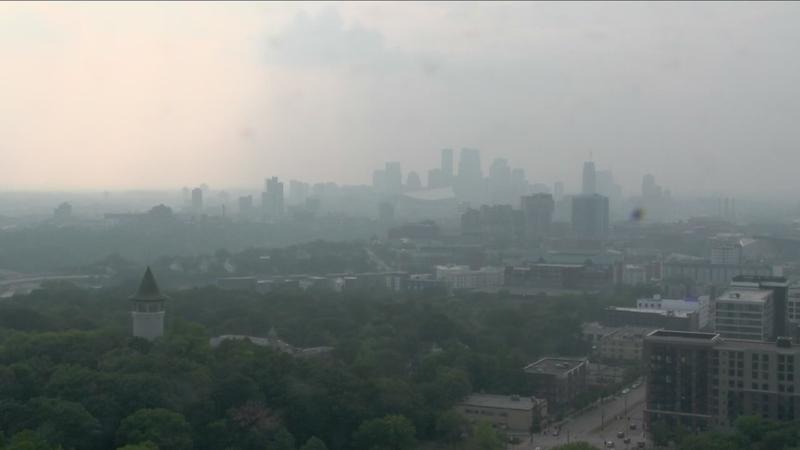Doctors, experts share concerns as hazardous air conditions linger in Minnesota
[anvplayer video=”5045353″ station=”998122″]
Over the last 24 hours we’ve seen historic air quality levels that some parts of Minnesota have never seen before.
While some communities have canceled outdoor activities Wednesday night, others are continuing and are being very cautious in these conditions.
"This summer has been particularly active with air quality events due to wildfires," said David Brown, an air quality meteorologist with the Minnesota Pollution Control Agency.
The MPCA monitors air quality daily. Tuesday was a historic day in north-central Minnesota, from Brainerd up toward Red Lake.
"We had measured air quality across the day yesterday, which has never happened in Minnesota," Brown said. "It’s a level that’s considered very unhealthy for everyone," Brown said.

Smoke from Canadian wildfires obscures the Minneapolis skyline Wednesday, July 21, 2021.[KSTP]
Pictures that show what looks like fog or even rain Tuesday over Gull Lake in the Brainerd Lakes area is actually haze from the Canadian wildfires.
It’s made being outside tough for many people.
"It is very smoky and like foggy," said Naysha Khot, who was out for a run with her dad Wednesday.
"It’s kind of dark and smoky, that’s how I would describe it," Khanderao Khot added.
Dr. Bryan Williams, a pulmonary and critical care physician for M Health Fairview, says these air quality conditions are problematic.
"We see increased doctor visits, increased emergency room visits, particularly for people with asthma who are extraordinarily sensitive to air quality," Williams said.
He says outdoor activities are still OK but urges people to be cautious.
"Those that have lung disease and know it definitely need to bring their rescue inhalers with them," Williams said. "I’m talking to a number of our kids that have asthma, and be prepared."
Experts say as dry as it is, we can expect the smoky haze to continue and air quality alerts to keep coming.
"I think the wildfires will persist throughout the summer, the smoke will come and go, but it certainly won’t be the last time smoke will be in our state, hopefully not that bad, but it will come and go," Brown said.